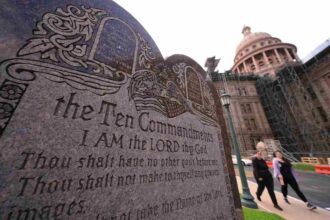Donald Trump has sparked renewed controversy by publicly endorsing the idea of using the U.S. military to enforce his plan for mass deportations of undocumented immigrants, should he return to office.
On November 18, 2024, Trump reaffirmed his intentions in a post on Truth Social, confirming reports that he would seek to declare a national emergency to facilitate mass deportations, using military assets to help remove millions of undocumented immigrants from the U.S.
Trump’s response came after conservative activist Tom Fitton, president of Judicial Watch, shared a post claiming that the incoming Trump administration was preparing to invoke a national emergency and deploy military resources to reverse what he called the “Biden invasion” at the southern border.

Trump reposted Fitton’s comment with a simple, “TRUE,” signaling his support for the controversial proposal.
This move, however, raises serious legal and constitutional questions. U.S. law generally prohibits the use of military personnel for domestic law enforcement under the 143-year-old Posse Comitatus Act.
READ ALSO: Trump Picks Oil Industry CEO Chris Wright as Energy Secretary
The law, which was enacted after the Civil War, restricts federal troops from participating in civilian policing except under certain conditions, such as when expressly authorized by law.
One of the key exceptions to the Posse Comitatus Act is the Insurrection Act, which allows a president to deploy military forces to enforce federal law or to suppress domestic unrest.
Critics argue that using the military to carry out mass deportations would be an abuse of this power, especially in the absence of a declared insurrection or civil unrest.
Trump’s proposal echoes the rhetoric he used during his 2016 campaign, where he promised to carry out the largest deportation effort in U.S. history.
While such an action would undoubtedly create political turmoil, it could also trigger a wave of legal challenges, given that using the military for mass deportations could be seen as a violation of longstanding American traditions that restrict military intervention in civilian matters.
The Brennan Center for Justice, a nonpartisan policy institute, has raised concerns about the gaps in the law governing domestic military use.

While the Insurrection Act gives the president broad powers, it has traditionally been used in cases of violent unrest, not for immigration enforcement. The legal debate surrounding Trump’s plan will likely intensify if he attempts to take action on it.
Should Trump proceed with his proposal, it would be one of the most significant and controversial uses of military power in the U.S. since the 2020 deployment of the National Guard to manage protests in Washington, D.C.
Following the death of George Floyd, the use of the National Guard sparked criticism for its role in quelling peaceful protests.
READ ALSO: Student Kills Eight in Wuxi Stabbing Rampage After Failing Exams
The Trump administration’s potential use of military forces for deportation would also draw intense criticism from civil rights groups.
Organizations like Protect Democracy have argued that such a move could further erode American democracy, warning against the use of military force to target vulnerable communities and suppress dissent.
As Trump continues to pursue his hardline immigration policies, this latest proposal adds to concerns over the future of civil liberties and the balance of power in the U.S.
It remains to be seen whether he will attempt to move forward with such an unprecedented and legally dubious plan if he is elected again.















